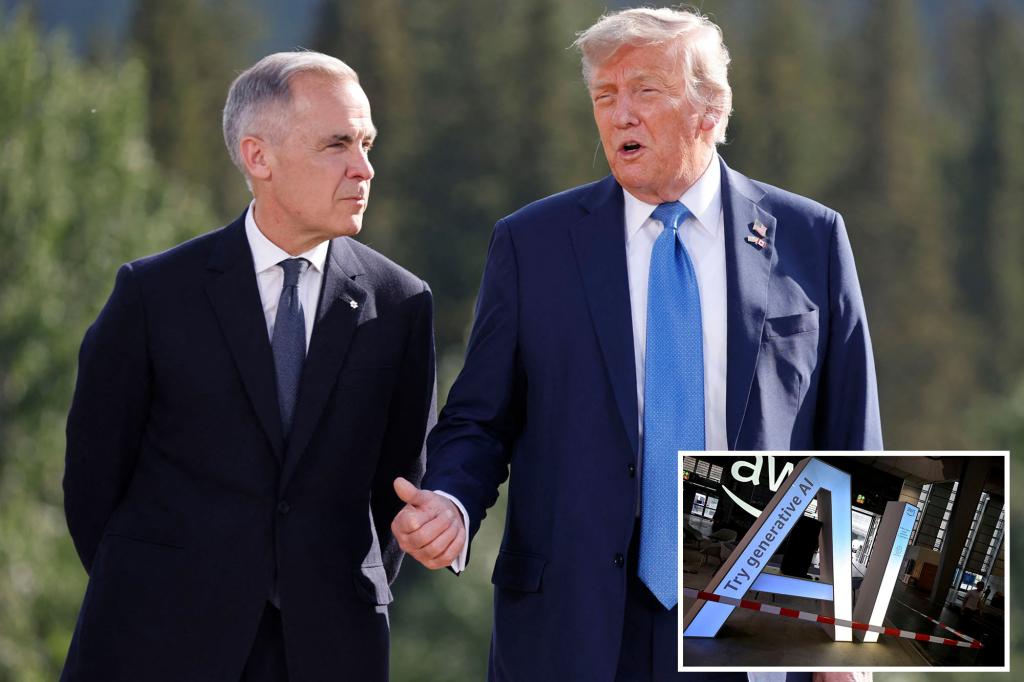
Canada has abruptly abandoned its plan to implement a new digital services tax targeting American technology firms, just days after former President Donald Trump criticized the move as a “direct and blatant attack” on the United States. The decision comes as Canadian Prime Minister Mark Carney seeks to revive stalled trade negotiations with the U.S. ahead of a critical July 21 deadline.
The tax, which was set to take effect on Monday, would have imposed a 3% levy on revenue generated by companies such as Amazon, Google, Meta, Uber, and Airbnb from Canadian users. The levy was expected to be applied retroactively, potentially saddling these firms with a $2 billion bill due in the U.S. by the end of the month.
Political Tensions and Economic Implications
The announcement comes after a heated exchange, with Trump halting trade talks on Friday, June 27, following Canada’s insistence on the tax. Trump threatened to impose new tariffs on Canadian goods, a move that could have reignited economic tensions between the two nations.
“We have just been informed that Canada … has just announced that they are putting a Digital Services Tax on our American Technology Companies, which is a direct and blatant attack on our Country,” Trump stated on Truth Social.
Trump accused Canada of mimicking the European Union’s approach to digital taxation, which is currently under negotiation with the U.S. He declared the immediate termination of trade discussions and hinted at forthcoming tariffs on Canadian imports.
Diplomatic Maneuvers and Economic Strategy
Prime Minister Carney’s office revealed that he spoke with Trump on Sunday night, agreeing to suspend the tax to resume negotiations. Canada’s Finance Minister François-Philippe Champagne is now tasked with introducing legislation to rescind the tax, as confirmed by a statement from Canada’s finance ministry.
“The DST was announced in 2020 to address the fact that many large technology companies operating in Canada may not otherwise pay tax on revenues generated from Canadians,” the ministry’s statement read, emphasizing Canada’s preference for a multilateral agreement on digital services taxation.
This development follows a meeting between Trump and Carney at the G7 summit in mid-June, where they had agreed to finalize a new economic deal within 30 days. The sudden policy reversal highlights the delicate balance of international trade relations and the economic power dynamics at play.
Historical Context and Future Outlook
Historically, Canada and the U.S. have maintained a robust trade partnership, though it has been periodically strained by disputes over tariffs and trade policies. The proposed digital services tax echoed similar initiatives in Europe, where countries have sought to tax digital giants that generate substantial revenues without corresponding tax contributions.
Experts suggest that while the tax was intended to ensure fair taxation of digital revenues, its abrupt cancellation underscores the complexities of unilateral tax policies in a globalized economy. The move to rescind the tax may ease immediate tensions, but it also raises questions about long-term strategies for taxing digital services.
As negotiations resume, both nations face the challenge of crafting a trade agreement that addresses the evolving digital economy while maintaining strong bilateral relations. The outcome of these talks will likely have significant implications for North American trade dynamics and the global approach to digital taxation.
The decision to scrap the digital services tax reflects a pragmatic approach to diplomacy, prioritizing economic stability and trade continuity over contentious policy measures. As the July 21 deadline approaches, all eyes will be on the U.S. and Canada to see how they navigate this complex economic landscape.






